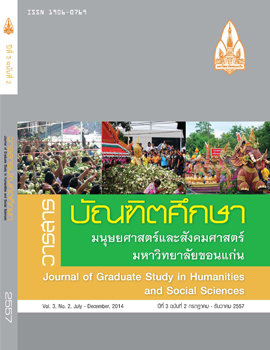ทุนทางสังคมในการตัดสินใจบริจาคอวัยวะของครอบครัวผู้บริจาคที่มีภาวะสมองตาย
คำสำคัญ:
ทุนทางสังคม, การบริจาคอวัยวะ, ภาวะสมองตาย, Social capital, organ donation, brain deathบทคัดย่อ
การวิจัยครั้งนี้มีวัตถุประสงค์เพื่อศึกษาและวิเคราะห์ทุนทางสังคมในการตัดสินใจบริจาคอวัยวะ ผลการวิจัย พบว่า โดยทั่วไปครอบครัวมีมุมมองต่อการตาย คือ หัวใจหยุดเต้น และไม่มีการหายใจ ความตายเป็นธรรมชาติ ผู้ที่ถึงแก่ความตายจะเดินทางไปสู่โลกแห่งวิญญาณเพื่อชดใช้กรรม ครอบครัวมีความเข้าใจภาวะสมองตายว่าเป็นอาการเสียหายทางสมองจนไม่สามารถใช้การได้ แพทย์ไม่สามารถรักษาได้ ทำให้ร่างกายไม่มีการตอบสนอง แม้ชีพจรจะยังเต้น อวัยวะบางส่วนยังคงทำงานและหายใจด้วยอุปกรณ์ บางครอบครัวถือว่าเป็นความทุกข์ทรมานเทียบเท่ากับตาย แต่ในบางครอบครัวก็ไม่เห็นด้วย ในการตัดสินใจบริจาคอวัยวะ ครอบครัวจะพิจารณาจากปัจจัยภายในและภายนอก ปัจจัยภายใน ได้แก่ ความเชื่อ ความเข้าใจความตายและภาวะสมองตาย บุคลิกของผู้ป่วยภาวะสมองตาย การรับรู้ความตั้งใจของผู้ป่วยภาวะสมองตาย ความเข้าใจการบริจาคอวัยวะ สถานภาพทางเศรษฐกิจของครอบครัว และ ความไว้วางใจการปฏิบัติงานของโรงพยาบาล ปัจจัยภายนอก ได้แก่ ลักษณะของผู้ป่วยภาวะสมองตาย ความสัมพันธ์กับแพทย์และพยาบาล การทำหน้าที่ของแพทย์และพยาบาล การรับรู้การบริจาคอวัยวะ และ สื่อ ซึ่งการตัดสินใจบริจาคอวัยวะแบ่งเป็น 3 ขั้นตอนคือ 1) ระยะก่อนการตัดสินใจ 2) การตัดสินใจบริจาคอวัยวะ และ 3) การยอมรับการตัดสินใจ เมื่อนำปัจจัยและการตัดสินใจบริจาคอวัยวะมาวิเคราะห์ ทุนทางสังคมของการตัดสินใจบริจาคอวัยวะ จะได้ทุนทางสังคม 3 ด้าน คือ 1) ทุนความรู้ 2) ทุนทางปัญญาและวัฒนธรรม และ 3) ทุนด้านระบบความสัมพันธ์ และ รูปแบบกระบวนการทุนทางสังคมที่เกิดขึ้นภายใต้การตัดสินใจบริจาคอวัยวะมี 3 ขั้นตอน ได้แก่ ระบบคิด วิธีปฏิบัติ และ ผลลัพธ์
Social Capital of The Decision Making of A Brain Death Donor’s Families
This study aimed to study were organ donation, and social capital in making a decision about organ donation among the brain death donors’ families. The results :
Generally death and brain death conditions were ongoing session of cardiac arrest, no signs of breathing, all organs stop functioning. Death is natural and journey to the world of karma redemption and spirits, brain death is a condition in which the brains get immensely damaged so that they cannot restore functions resulting in a non-responsive body while the pulse still remains active. Some organs still work, and the patients can breathe only with assisting respiration devices. The brain death patients cannot move parts of their bodies, the brain death condition is reckoned to contain as much suffering as death. Factors affecting making the decision for organ donations are internal and external factors. Internal factors were beliefs, understanding about death and brain death condition, the brain death patients’ personality, recognition of the patient’s intention for organ donation, understanding about organ donation, economic background of the families, and trust in the hospitals. External factors were; condition of the brain death patients, medical relationship with doctors and nurses, medical performances of doctors and nurses, information about organ donation, and media. Organ donation involves the patients’ families in processing through three phrases; 1) pre-decision making period, 2) decision making period, 3) decision compliance Social capital factors that affect the decision making for donating organs are three folds; 1) Intellectual capital, 2) Wisdom and cultural capital, and 3) Inter-personal relationship capital. Social capital involved in decision making for organ donation at three stages, namely, thinking stage, implementing stage, and outcome stage.







